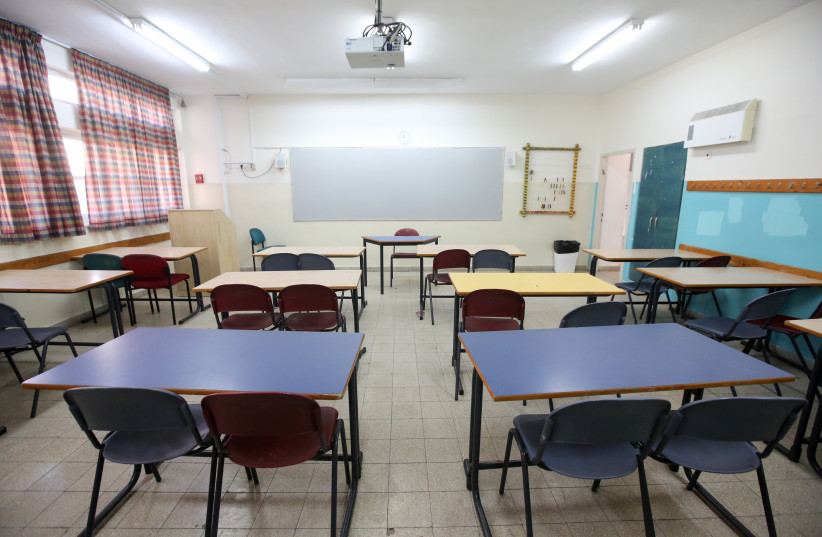The number of active cases in the country has decreased to 6,363, including 105 patients in serious condition and 82 intubated. To date, 229 citizens have died of coronavirus.

Schools across the country will open their gates and classrooms for the first time in nearly two months on Sunday morning, after the cabinet voted to recommence in-school learning for children in first to third grade, and eleventh to twelfth grade.
According to the government’s decision announced Friday, schools for special education will open fully, and ultra-Orthodox school pupils from seventh to eleventh grade will return to the classroom.
A decision regarding fourth to tenth graders will be made later in the month, with a return to school required before the end of May. Kindergartens and preschools are scheduled to reopen next Sunday.
The noise of boisterous schoolchildren will not fill the playgrounds of all schools, however, following a series of local authorities who rejected the government’s decision.
Members of Forum-15, the Israeli Forum of Self-Governed Cities, expressed concern that they would be unable to implement the decision safely in such a short time frame, calling the decision “irresponsible and even dangerous, despite its good intentions.”
Nearly all its members – Ashdod, Beersheba, Haifa, Herzliya, Netanya, Ramat Gan, Rishon Lezion and Tel Aviv – said they would not open schools on Sunday.
In a statement, the forum explained that municipal members were not given enough time or practical guidelines for reopening the education system, and they believed that they would be unable to implement the move in a safe manner. Givatayim and Holon municipalities, both members of the forum, said they would open schools, although schools in Holon will only welcome pupils in eleventh and twelfth grade.
Shomron Regional Council head Yossi Dagan said he hopes to open schools on Monday.
The contentious decision to reopen schools comes despite a continued decline in the number of active coronavirus cases in Israel.
As of Saturday evening, the number of active cases in the country have decreased to 6,363, including 105 patients in serious condition and 82 requiring intubation. To date, 229 citizens have died and 9,593 have recovered from the virus.
At this stage, attending school will not be mandatory, except for students learning for their matriculation exams. The Education Ministry said it will work with the schools to obtain the tools necessary to ensure the health and safety of students and teachers.
Education Minister Rafi Peretz confirmed that he supported the decision reached by the ministerial committee and that the education system is ready to open on Sunday. He said he expects “hectic discussions” with the Health Ministry in the coming weeks as they determine how best to open the rest of the system.
Meretz party leader Nitzan Horowitz opposed the decision, calling it disorganized.
“[Prime Minister Benjamin] Netanyahu is playing yo-yo with the education system,” Horowitz said. “Instead of making organized decisions after serious administrative work, the most fateful decisions concerning the children, parents and teachers are made through improvisation and at the last minute.”
The government was scheduled to convene again late Saturday and on Sunday evening to discuss further easing of restrictions to contain the coronavirus outbreak. One decision reached by the government prior to press time was the lifting of a ban on workers aged over 67 from returning to work.
Topics scheduled for discussion include the possible reopening of malls and markets, the easing of current limits on employees at the workplace, the opening of gyms, and the cancellation of the 100-meter limit on movement outside the house.
The Histadrut trade federation said it had reached an agreement on Saturday night with the Finance Ministry to enable an increased number of public sector employees to return to work, in accordance with “purple standard” protection criteria required by the Health Ministry. The agreement, the Histradrut said, aims to increase the level of service available to citizens by public bodies.
The vast majority of local municipalities have not recorded any new cases of the coronavirus in the past three days, according to data published by the Health Ministry on Saturday. Jerusalem registered the most new cases – 99 in total, or an increase of 2.9%.
The latest epidemic hotspot concerning health authorities, however, is the southern Bedouin town of Hura, home to approximately 17,000 residents. Some 30 new cases have been recorded there in the past three days, representing a 43.5% increase in active cases.
Lockdowns on two neighborhoods in the town, and the Jerusalem neighborhood of Romema Merkaz, are expected to expire at midnight on Sunday.
As the government seeks to gradually restore the economy to full operations, Transportation Minister Bezalel Smotrich announced that train travel will gradually recommence from the evening of May 16. The move will require Health Ministry approval, and passengers will be required to wear masks and have their temperature checked.
The railway connecting Tel Aviv Central Station and Herzliya will not reopen immediately due to ongoing electrification work. The project will ultimately enable trains to run directly between Jerusalem’s Yitzhak Navon Station, Tel Aviv and Herzliya.
In addition, Smotrich approved a proposal from the National Public Transport Authority to permit public transportation after 8 p.m. from May 5.
Despite moves to reopen the economy, self-employed workers and small business owners joined forces with salaried employees to rally again on Saturday evening against what they perceive as insufficient financial support provided by the government.
Protests were held at Charles Clore Park in Tel Aviv, outside the former Hamashbir building on King George St. in Jerusalem, UNESCO Square in Haifa and outside the Beersheba municipality building.
“We want to show the government that it cannot divide us into sectors,” said protest organizers. “We all have a common interest to force the government to make significant decisions. As long as the government thinks we can be divided, they reach decisions that are simply a matter of deception. We will show them that we are united.”
As reported by The Jerusalem Post
